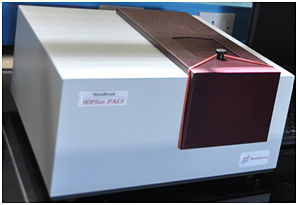|
The DLS Particle Size and Zeta Potential Analyzer is a user-friendly system for colloidal, nanoparticulate and macromoleculer characterization. It can determine particle size distribution, particle zeta potential (related to the magnitude of the electrical charge at the particle surface) and molecular weight of large polymeric substances dispersed in water. The significance of zeta potential is that its value can be related to the stability of colloidal dispersions (e.g., a multivitamin syrup). The zeta potential indicates the degree of repulsion between adjacent, similarly charged particles (e.g., the vitamins) in a dispersion. For molecules and particles that are small enough, a high zeta potential will confer stability, i.e., the solution or dispersion will resist aggregation. When the potential is low, attraction exceeds repulsion and the dispersion will break and flocculate. Dynamic Light Scattering (DLS) principle can be used to determine the size distribution profile of small particles in suspension or polymers in solution. It can also be used to probe the behaviour of complex fluids such as concentrated polymer solutions.
|


